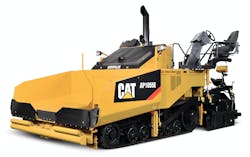Intercounty Paving shoots for smoothness incentives on JFK job
Contractors that handle the big jobs—airports and interstates in particular—have more needs from a paver than they can count. But the exceptional contractors, a list that includes Intercounty Paving Associates in Hicksville, N.Y., always remember the basics.
“The jobs we work have tight deadlines,” said John Lizza, principal owner of Intercounty. “If the paver doesn’t run, we fall behind. We need a paver that is reliable, and keeps our crews going.”
The jobs also require a paver with power, as company crews must pull tons of asphalt on both airports and interstates.
Reliability and power should be among the top priorities of all contractors. But sometimes the basics can be forgotten in pursuit of the latest trend, or a lower initial purchase price.
Intercounty believes a quality paver pays for itself quickly.
“Power enables steady movement of the paver, even at wide widths,” said Joe MacDougall, paving superintendent for Intercounty. Steady movement is, of course, an essential smoothness ingredient. Contractors are increasingly under pressure to hit smoothness targets on projects such as highways and airport runways—including Intercounty’s recent project at John F. Kennedy International Airport in New York.
“Those projects are our bread and butter,” Lizza said. “We have to be successful on the jobs, particularly as most agencies emphasize smoothness. They’re putting in penalty/bonus incentives, so you really must provide a product that will last and meet smoothness specs. With the Cat paver, we’re able to achieve those smoothness bonuses.”
Airport projects rarely include bonuses, but specs typically stipulate penalties. “Every time we bring out a diamond grinder to hit a spec, it costs us $30,000-$40,000,” Lizza said.
MacDougall expects the pavers to continue to provide the power and reliability the crews need.
